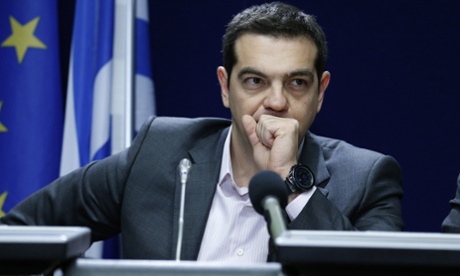
Greece’s eurozone creditors are considering bringing forward a financial lifeline for Athens by a few weeks after Alexis Tsipras, the Greek prime minister, told EU leaders the country would be insolvent by the end of April without assistance.
In a key three-hour meeting in Brussels that ended in the early hours of Friday, Tsipras informed his creditors if they wait until the end of April before releasing funds, it will be too late for Greece. According to an account of that meeting policymakers are now discussing whether they can supply emergency funding earlier than previously agreed. Tsipras was also advised to treat the Eurocrats working in Athens with more respect and ensure their safety.
Under the terms of an agreement on Greece’s bailout last month, some €7.2bn (£5.1bn) in rescue funds were not to be disbursed until the end of April and only on condition that Tsipras’s left-wing government had persuasively shown it was committed to enforcing austerity in the country.
Chancellor Angela Merkel of Germany concluded a two-day EU summit in Brussels on Friday by stressing Tsipras had to present a “comprehensive” reform package urgently and this would need to be endorsed by the Eurogroup of finance ministers before Greece could access any of the funds.
Merkel’s remarks came after the crucial meeting, that ran until 2am on Friday, when Tsipras came face-to-face for the first time with the leaders of his key creditors – Merkel and Mario Draghi, the president of the European Central Bank.
The other five present at the crisis talks were the French president, François Hollande; the presidents of the European Commission and Council, Jean-Claude Juncker and Donald Tusk; Jeroen Dijsselbloem, head of the committee of eurozone finance ministers; and Uwe Corsepius, a senior eurocrat who has just been appointed Merkel’s EU adviser.
Tsipras had requested the meeting and had been confrontational in the days preceding it. According to an authoritative account of what took place, he started the negotiations by making it clear he expected urgently needed bailout funds released without giving very much in return.
According to the account, he was disabused of that notion within 10 minutes and the meeting then ran smoothly, except for an episode where the new Greek leader was upbraided by Draghi, who is furious at the way senior EU officials monitoring the terms of the Greek bailout are being treated in Athens.
According to senior officials in Brussels, the Tsipras government has been orchestrating a campaign of intimidation against the eurocrats in Athens, frustrating their work and refusing all access.
Visiting Athens this week, they were confined to a luxury hotel and denied access to government ministries. Their whereabouts were leaked to the media and “aggressive” demonstrations were staged outside the hotel. One of the top officials needed two bodyguards. Draghi was said to have read Tsipras the riot act, while the others demanded cooperation with the creditors.
Merkel was said to have soothed things by telling Tsipras that, when International Monetary Fund officials go to Berlin, they are granted access to everything they need, even when it is a little humiliating.
EU leaders such as Dijsselbloem and Wolfgang Schäeuble, the German finance minister, have stated repeatedly in the past fortnight the Tsipras government has destroyed all trust with its creditors. It has fallen to Tusk, who organised and chaired the midnight session, to mediate and seek to rebuild confidence on both sides.
In their public appearances following the summit on Friday afternoon, Merkel and Tsipras said contrasting things. Tsipras emphasised Merkel had accepted that the old bailout terms were history. The German leader, in turn, stressed a eurozone-conducted audit of Greek reforms, what had been done and what remained to be done to meet the terms of the bailout, remained the basis of the rescue programme.
That audit was conducted in December before Tsipras came to power. It is called the fifth review. Merkel made clear that remained a reference point for measuring Greek reforms. Tsipras said the fifth review was dead and that the eurozone accepted that.
Despite the public squabbling, in private Tsipras disclosed his priority, for reasons of domestic political consumption, was to portray the reform package as something new, quite different from the austerity programmes imposed on Greece for the past five years.
He did not balk at the tough bailout terms outlined by Merkel, Draghi and Dijsselbloem, according to the account, as long as he was able to present the package as a sovereign Greek government decision. Merkel made a point of saying afterwards that Greece would take “own responsibility” for and “ownership” of the reforms being demanded.
EU leaders, including Merkel, can accept this, provided the net effect of the reforms Tsipras draws up remains roughly equivalent.
Tsipras is expected to deliver a much more detailed blueprint of reform proposals within 10 days. They have to be blessed by the eurogroup before any further releases of money. Policymakers in Brussels says there is an absolute determination on both sides of the conflict to keep Greece in the single currency, but they concede blundering into an exit cannot be ruled out.

